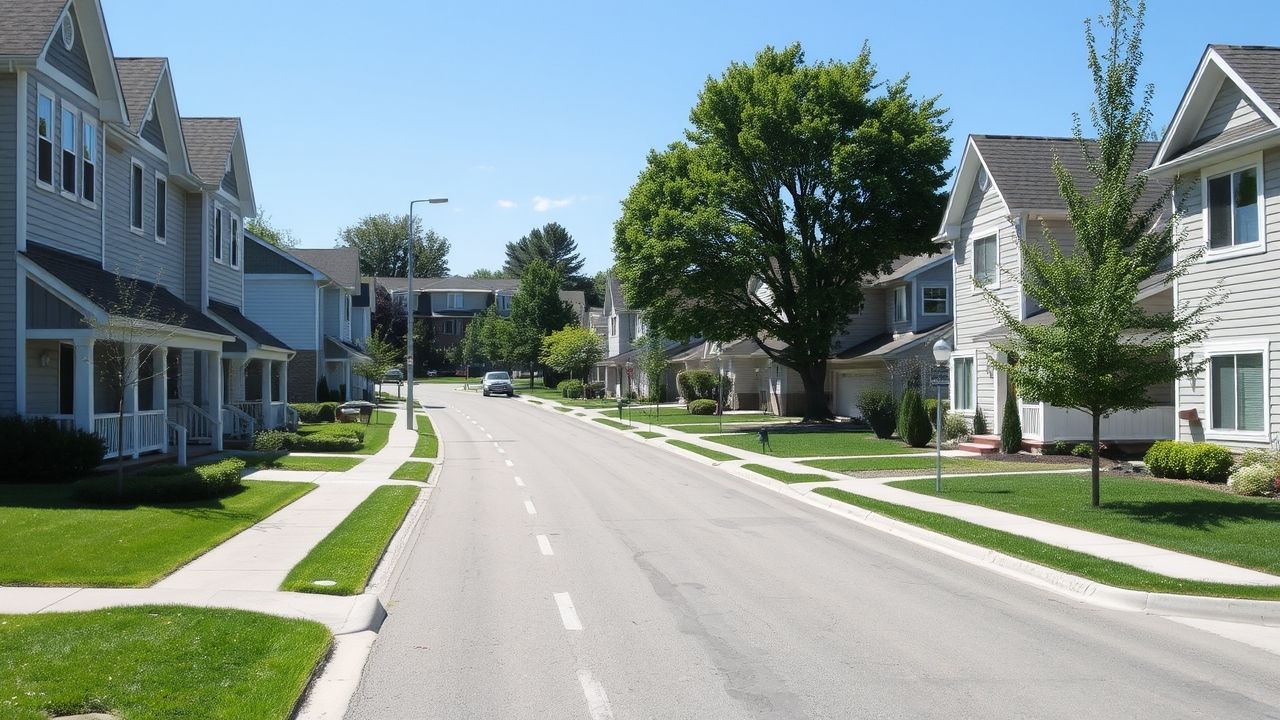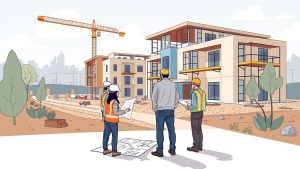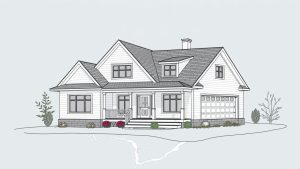Are you thinking about buying a house next year, maybe in a place like Milton or Mississauga?
Lots of people are wondering what will happen with homes in the Greater Toronto Area (GTA) and nearby towns like Georgetown and Guelph in 2025. Will it be easier to buy? Will prices go up or down? It’s a big decision, maybe the biggest money decision you’ll ever make! Understanding what might happen can help you feel ready.
This guide will try to make things simple. We’ll look at what the experts are guessing about buying and selling houses in 2025. We’ll talk about prices, how many homes might be sold, and things like inflation (when prices for everything seem to go up) and mortgage rates (the cost to borrow money for a house).
What’s Happening with Home Sales in 2025?
Experts who watch the housing market, like the people at the Toronto Regional Real Estate Board (TRREB), have made some guesses for 2025.
They think more homes will be sold in the GTA in 2025 compared to 2024. How many more? They guess around 76,000 homes will be sold. That’s like 12 more homes sold for every 100 sold the year before (a 12.4% increase).
Why do they think this? A big reason is money.
- Borrowing Money Might Get Cheaper: The cost to borrow money for a house (this is called the mortgage rate) might go down a bit in 2025. When borrowing is cheaper, more people can afford to buy a home.
- More Choices: There are also quite a few homes available to buy. When there are more choices, buyers have a better chance of finding something they like and can afford.
So, the idea is that slightly lower borrowing costs plus a good number of houses for sale will make more people feel ready to buy. People who were waiting might decide 2025 is the right time.
Think about it like this: if your favourite ice cream shop lowered its prices and had lots of flavours you liked in stock, you’d be more likely to buy ice cream, right? It’s kind of similar for houses.
Will House Prices Go Up in the GTA, Milton, and Mississauga?
This is the big question everyone asks! Will houses cost more in 2025?
The experts at TRREB think prices will go up, but only a little bit. They guess the average price for all types of homes (like detached houses, townhouses, condos) across the GTA will reach about $1,147,000.
How much of an increase is that from 2024? It’s about 2.6%. That means for every $100 a house cost in 2024, it might cost about $2.60 more in 2025, on average.
Now, $1,147,000 sounds like a LOT of money, and it is. Remember, this is an average for the whole GTA. Prices are different depending on:
- Where you look: Homes in downtown Toronto cost more than homes in places like Milton, Georgetown, or Guelph.
- What type of home: Big detached houses usually cost more than smaller townhouses or condo apartments.
TRREB also thinks that prices for single-family homes (like detached houses) might go up a bit more than prices for condo apartments. They say the condo market has a lot of supply (many condos available for sale), which usually keeps prices from rising too fast.
So, while the average price might go up moderately, your own experience will depend on where you are looking and what kind of home you want.
Inflation and Home Prices: What’s the Link?
You hear the word “inflation” a lot. What does it mean?
Inflation is just when the prices for most things you buy go up over time. Think about groceries, gas for your car, clothes. If you notice you’re paying more for the same stuff compared to last year, that’s inflation.
How does this connect to houses?
Houses are a thing people buy, just like groceries. So, inflation can affect house prices too. Sometimes, people like to buy things like houses or gold when there’s inflation because they hope the value of these things will go up faster than the money in their savings account.
But inflation also makes everything more expensive. So, if your grocery bill is higher, it’s harder to save money for a down payment on a house.
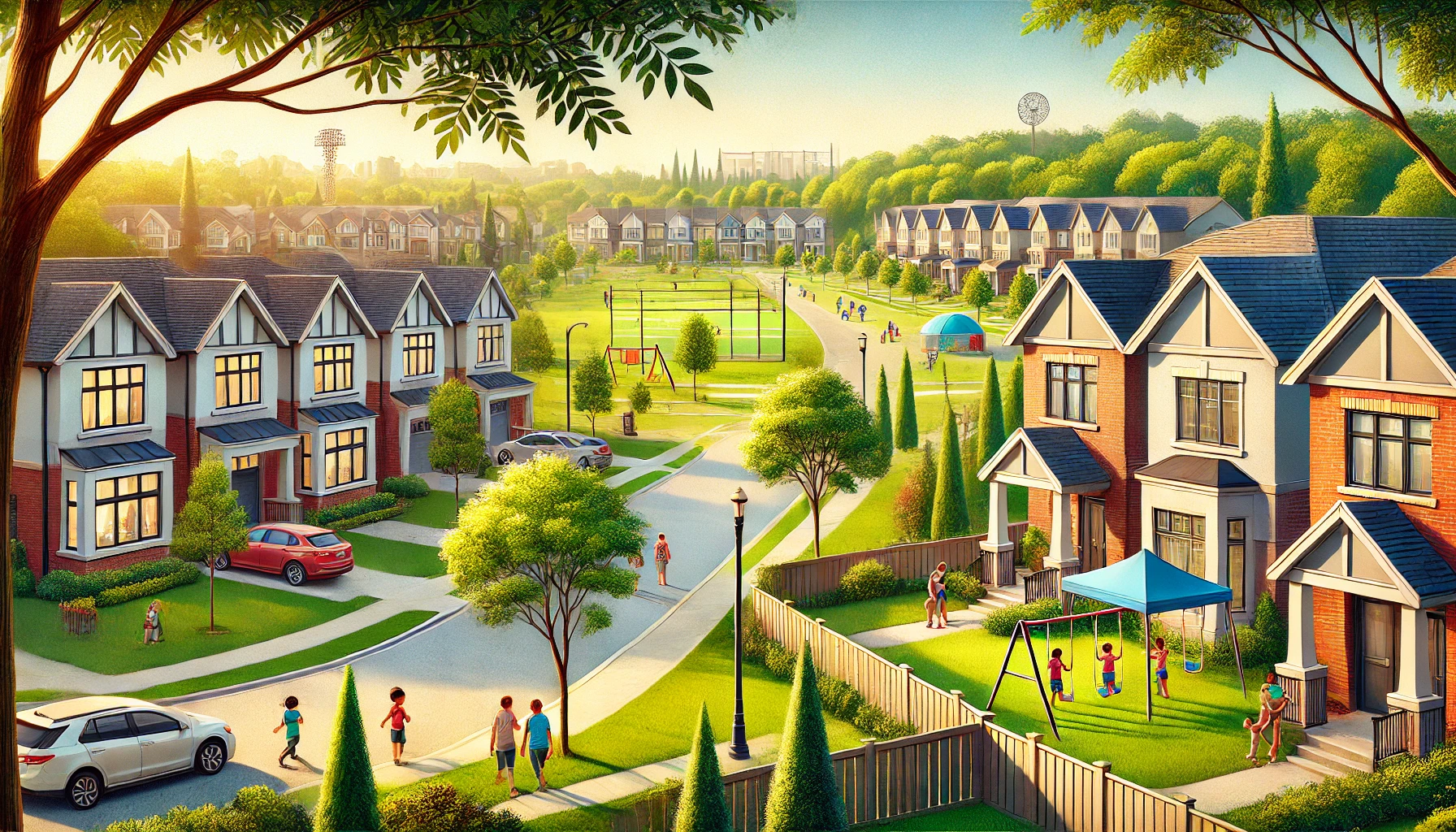
How Inflation Affects Real Estate Generally
Inflation can be a mixed bag for real estate:
- Good Thing? Sometimes, house prices go up because of inflation. People see houses as a safe place to put their money when other prices are rising. The cost to build new houses also goes up with inflation (wood costs more, workers cost more), which can push prices of existing homes up too.
- Bad Thing? High inflation makes life more expensive. This makes it harder for people to save up that big chunk of money needed to buy a house (the down payment). It also makes the monthly costs of owning a home (mortgage, property taxes, heating) feel bigger because you have less money left after buying other necessities.
So, inflation can push house prices up, but it can also make it harder for people to actually buy those houses.
Mortgage Rates and Inflation: The Big Question
Here’s another connection: inflation and the cost of borrowing money (mortgage rates).
Usually, when inflation is high, the people in charge of the country’s money (like the Bank of Canada) try to slow it down. One way they do this is by making borrowing money more expensive. They raise interest rates.
When interest rates go up, mortgage rates usually go up too. This makes buying a house more expensive each month.
But wait! Didn’t we say experts think borrowing costs might go down a bit in 2025? Yes.
Inflation seems to be cooling down a little from its super high levels. Because of this, many experts think the Bank of Canada might start lowering interest rates slowly in late 2024 or 2025. If that happens, mortgage rates could follow and become a little cheaper.
This is a big reason why TRREB thinks more people might buy homes in 2025. Cheaper borrowing makes a huge difference.
Quick Tip: Fixed vs. Variable
When you get a mortgage, you might choose:
- Fixed Rate: The cost stays the same for a set number of years (like 5 years). You know exactly what you’ll pay each month.
- Variable Rate: The cost can go up or down depending on what the Bank of Canada does. It’s sometimes cheaper to start, but it’s less predictable.
If rates are expected to go down, some people might think about a variable rate. But a fixed rate gives you peace of mind. Talk to a mortgage expert about what’s best for you!
Real Estate Market Inflation: What Does It Mean for You?
When we talk about “real estate market inflation,” we just mean house prices going up.
As TRREB guessed, house prices in the GTA are expected to go up by about 2.6% in 2025. This is considered moderate growth. It’s not the crazy price jumps we saw a few years ago.
What does this mean for you if you want to buy in Milton, Mississauga, Georgetown, or Guelph?
- It means waiting might cost you a bit more, but maybe not a huge amount more.
- It suggests the market is becoming a bit more stable or balanced.
- It reinforces that buying a home is a long-term plan. You’re not likely to see prices double in one year, but over many years, owning a home has often been a good way to build wealth.
Should I Buy a Home During Inflation? Is 2025 a Good Time?
This is the million-dollar question (sometimes literally!). Is 2025 the right year to jump into the housing market, especially with inflation still around?
There’s no single answer that’s right for everyone. It depends on YOUR situation. But here are some things to think about:
Reasons 2025 Might Be Good:
- Prices Expected to Rise (Moderately): If prices are expected to go up by 2.6%, buying sooner means you get in before that increase. It’s not a huge jump, but it’s something.
- Borrowing Costs Might Ease: If mortgage rates do drop a little as expected, your monthly payments could be lower than they were in 2024. This could make buying more affordable.
- More Choice: TRREB mentioned a good supply of homes. More choice means less pressure to make a rushed decision and a better chance of finding the right fit.
- Lots of People Are Planning To: Remember that poll? 28% of people said they are likely to buy in 2025. This shows that many people feel it might be a good time.
- Long-Term Investment: Owning a home is usually a long-term plan. Trying to perfectly time the market (buy at the very lowest price) is almost impossible. If you plan to stay in the home for many years, small ups and downs matter less.
Reasons to Be Cautious in 2025:
- Affordability is Still Tough: Even with moderate price growth and slightly lower rates, homes in the GTA are expensive. The high cost of living due to inflation makes saving for a down payment and affording monthly costs hard.
- Economic Worries: TRREB mentioned things like trade problems could slow down the economy. If the economy isn’t doing well, people might worry about their jobs, which makes buying a house feel risky.
- Prices Could Stall or Dip: While experts predict a moderate rise, predictions can be wrong. Economic problems could cause prices to stay flat or even dip slightly in some areas.
What Experts Say:
Jason Mercer, who studies the market for TRREB, said, “A growing number of homebuyers will take advantage of lower borrowing costs as we move toward the 2025 spring market… However, the positive impact of lower mortgage rates could be reduced… by the negative impact of trade disruptions on the economy…”
This means he sees good signs (lower rates) but also risks (economy).
So, what’s the bottom line?
Buying in 2025 could be a good move if:
- You are financially ready (good job, savings for down payment, manageable debt).
- You plan to own the home for several years (5+ years is often recommended).
- You find a home you like in a place you want to live (like Milton, Mississauga, Georgetown, Guelph).
- You can comfortably afford the monthly payments, even if costs go up a bit.
If you’re stretching your budget too thin, or you’re worried about your job stability, it might be better to wait and save more.
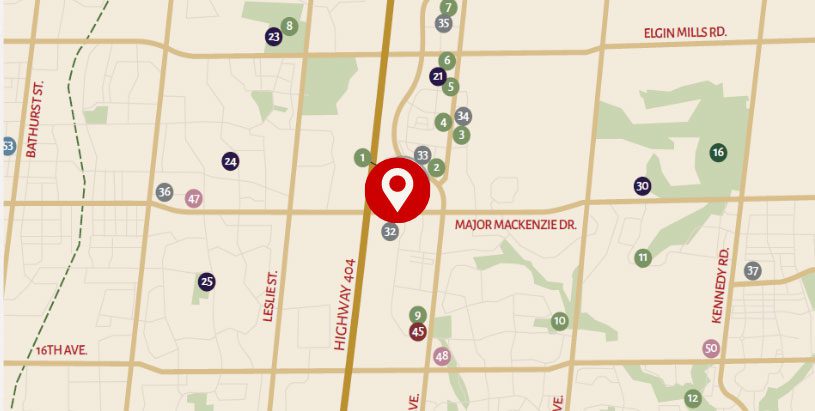
House Prices Rising Inflation: Keeping Pace?
TRREB said they expect house price growth (2.6%) to be at the rate of inflation. What does that mean?
It means they think house prices will go up about the same amount as the prices of other general goods and services. Your house value might keep up with inflation, but not zoom way ahead of it.
This is different from times when house prices grew much, much faster than inflation. A market where prices rise roughly with inflation is often seen as more stable and healthy.
For buyers, this means less pressure to buy immediately out of fear of missing out on huge price gains. For homeowners, it means their investment is likely holding its value against the rising cost of everything else.
Inflation Impact on Mortgage Payments
Inflation itself doesn’t directly change your existing fixed mortgage payment. If you have a fixed rate, your payment stays the same for the term.
But inflation influences the new mortgage rates being offered. If inflation stays high, rates might stay high or go higher. If inflation cools, rates might come down, like experts hope for 2025.
Let’s see how a small change in mortgage rates affects payments. This is just an example (talk to a mortgage broker for real numbers!):
- Imagine you borrow $500,000.
- At a 5.5% interest rate, your monthly payment (just principal and interest, paid over 25 years) might be around $3,060.
- If the rate drops to 5.0%, that payment might be around $2,910.
That’s a difference of $150 per month, or $1,800 per year! Even small changes in interest rates, partly influenced by inflation, make a big difference to your budget.
This is why the prediction of slightly lower rates in 2025 is important news for home buyers.
Cost of Living and Home Buying: The Squeeze
We’ve touched on this, but it’s important. Inflation doesn’t just affect house prices and mortgage rates. It affects everything.
- Groceries cost more.
- Gas costs more.
- Childcare costs more.
- Going out costs more.
This ‘cost of living’ squeeze makes it harder to buy a home:
- Saving a Down Payment: It’s tough to save thousands of dollars when your daily expenses keep rising. The Ipsos poll showed buyers still plan to put down a lot of money (average of 28%), which takes serious saving!
- Affording Monthly Costs: Once you buy, you have the mortgage, property taxes, insurance, utilities (heating, electricity), and maintenance. Higher inflation means all these costs can go up, putting pressure on your budget.
People know this. The poll found that most people think high taxes are making homes less affordable. They worry that if taxes keep going up, they’ll have to change their buying plans.
When thinking about buying, don’t just look at the mortgage payment. Think about ALL the costs of owning a home and make sure they fit into your budget, even with the higher cost of living.
Economic Trends Real Estate: What Else is Happening?
Besides inflation and interest rates, what else is going on that could affect your home buying journey in places like Milton or Guelph?
- The Economy’s Health: As mentioned, worries about economic slowdowns or trade problems could make people nervous about big purchases like houses. A strong economy usually means a stronger housing market.
- Jobs: Are companies hiring? Are wages going up? If people feel secure in their jobs, they are more likely to buy homes.
- Building New Homes: Are builders putting up enough new houses and apartments? More supply helps keep prices from rising too quickly. TRREB mentioned the need for more ‘missing middle’ housing (like townhouses and duplexes) and rental buildings.
- Government Rules: Things like taxes, rules for getting a mortgage, and programs to help first-time buyers can all impact the market. TRREB mentioned high development charges (fees builders pay) can make new homes more expensive.
Keep an eye on news about jobs and the overall economy in Ontario. These trends play a role in the housing market.

Housing Affordability Inflation: The Big Challenge
Let’s be honest: buying a home in the GTA and surrounding areas is hard. Prices are high, and inflation makes everything else expensive too. This is the challenge of housing affordability.
TRREB President Elechia Barry-Sproule said we need more types of homes: “Encouraging the development of missing-middle housing—such as townhomes, duplexes, and low-rise multi-unit buildings—is critical to delivering a range of attainable options…”
This means building more than just giant houses or tiny condos. We need options in between that more people can afford.
High taxes and fees also add to the cost. TRREB CEO John DiMichele pointed out that “high development charges, taxes, and administrative hurdles… stalls progress on building the housing supply we need…”
So, while the forecast for 2025 offers some hope (stable prices, maybe lower rates), the bigger challenge of making homes affordable for regular families in places like Mississauga and Georgetown remains.
Tips for Buying a Home in Milton, Mississauga, Georgetown, or Guelph Now
Feeling overwhelmed? It’s normal! Buying a home is a big process. But you can do it. Here are some simple steps and tips, keeping the 2025 forecast in mind:
-
Know Your Budget (Really Know It):
- Don’t just guess. Use online calculators or talk to a bank or mortgage broker.
- Figure out how much down payment you have saved (or can save soon).
- Get pre-approved for a mortgage. This means a lender tells you exactly how much they will likely lend you. It makes you a stronger buyer!
- Remember costs beyond the mortgage: property taxes, insurance, utilities, closing costs (lawyer fees, land transfer tax), moving expenses, and maybe immediate repairs or furniture.
- Be realistic about what you can afford comfortably each month, considering the high cost of living.
-
Get Your Finances in Order:
- Check your credit score. A higher score usually means you can get a better mortgage rate. Pay bills on time and try to lower other debts.
- Gather your documents: You’ll need proof of income (pay stubs, tax returns), bank statements, ID, etc. Having these ready makes the mortgage process smoother.
-
Think About What You NEED vs. WANT:
- How many bedrooms do you absolutely need?
- How important is a big backyard? Or being close to schools or work?
- Make a list of your must-haves and nice-to-haves.
- Be flexible. Given the prices, you might need to compromise on size, location, or condition.
-
Explore Different Areas:
- Prices vary a lot between Toronto and places like Milton, Mississauga, Georgetown, and Guelph. And even within those towns, some neighbourhoods are more expensive than others.
- Think about commute times, schools, parks, shops.
- Drive around different areas at different times of day to get a feel for them.
-
Consider Different Home Types:
- Detached House: Stands alone, usually has a yard. Often the most expensive.
- Semi-Detached: Shares one wall with a neighbour.
- Townhouse: Shares walls on both sides (unless it’s an end unit).
- Condo Apartment: You own your unit, share common areas (hallways, gym). Often involves monthly condo fees.
- Maybe a smaller home or a condo is a more affordable way to get into the market now.
-
Work With Experts:
- Mortgage Broker: They can shop around at different lenders to find you the best mortgage rate and product. Their help is usually free for you (they get paid by the lender).
- Real Estate Agent: A good local agent knows the market in areas like Milton or Mississauga. They can help you find listings, arrange viewings, advise on pricing, negotiate the offer, and guide you through the paperwork. Their fee is typically paid by the seller.
- Home Inspector: Before you finalize the purchase, hire an inspector to check the house’s condition (roof, furnace, plumbing, etc.). This helps avoid nasty surprises.
- Real Estate Lawyer: You need a lawyer to handle the legal parts of buying a home (checking the title, transferring ownership).
-
Be Patient But Ready:
- Finding the right home can take time. Don’t feel pressured to buy the first place you see.
- But be ready to act when you find a home you love and can afford. Have your pre-approval and down payment ready so you can make an offer quickly if needed.
-
Understand the Offer Process:
- Your agent will help you write an offer, which includes the price, closing date (when you take ownership), and conditions (like getting financing approved or having a satisfactory home inspection).
- The seller can accept, reject, or make a counter-offer.
- Negotiating is normal!
What About Selling Your Home in 2025?
Maybe you already own a home in the GTA and are thinking of selling, perhaps to move to a different area like Guelph or downsize.
The Ipsos poll found that 37% of homeowners surveyed are thinking about selling in 2025. That’s quite a few people!
If sales pick up as expected (that 12.4% increase), it could mean more buyers looking at your home. Moderate price growth (2.6%) is also good news for sellers.
If you’re selling, it’s still important to:
- Price your home correctly based on recent sales of similar homes nearby.
- Make sure your home looks its best (clean, decluttered, maybe some fresh paint).
- Work with a local real estate agent who knows how to market your property.
Frequently Asked Questions (FAQ)
Q1: Is it better to buy in 2025 or wait until 2026?
A: Nobody knows for sure! Experts predict moderate price increases and slightly lower borrowing costs in 2025. Waiting might mean paying a bit more or facing different interest rates. But your personal financial situation is the most important factor. If you’re ready in 2025, it could be a good time. If you need more time to save, waiting might be better for you.
Q2: Are houses really becoming more affordable in the GTA?
A: Affordability is still a big challenge. While the predicted price increase (2.6%) is small, and rates might drop slightly, overall prices are very high compared to average incomes. True affordability likely needs bigger changes, like more housing supply of different types.
Q3: What’s the single biggest tip for a first-time buyer in Milton or Mississauga?
A: Get pre-approved for your mortgage before you start looking seriously at houses. Knowing exactly how much you can borrow and what your payments will be gives you confidence and makes your offer stronger.
Q4: How much down payment do I really need?
A: The minimum depends on the home price. For homes under $500k, it’s 5%. Between $500k and $1M, it’s 5% on the first $500k and 10% on the portion above that. For homes over $1M, it’s 20%. The poll showed buyers intend to put down an average of 28%, which is much higher than the minimum, likely to reduce monthly payments or qualify for a better mortgage.
Q5: Does inflation mean my house will definitely increase in value?
A: Not necessarily, or not always at the same rate as inflation. House prices depend on many local factors like supply, demand, interest rates, and the economy. While real estate has historically been a good hedge against inflation over the long term, there’s no guarantee for any specific year.
Q6: Is it safe to buy a home if there are worries about the economy?
A: It involves risk. If the economy slows down, job security could be affected, and house prices could potentially dip. That’s why it’s crucial to buy only if you feel secure in your job and can comfortably afford the payments, leaving some room in your budget for unexpected events.

Ready to Take the Next Step?
Thinking about buying a home in Milton, Mississauga, Georgetown, Guelph, or other great spots in the GTA can be exciting, even with all the things to consider.
The forecast for 2025 suggests a market with more activity and moderate price growth. Lower borrowing costs could help, but affordability and the cost of living are still major factors.
Understanding these trends is the first step. The next step is figuring out what’s right for you.
If you’re serious about buying, getting expert advice tailored to your situation is key. Knowing your budget, understanding the process, and having someone guide you can make a world of difference.
Want to make your home buying journey smoother and potentially save thousands? Download our FREE Buyer’s Guide packed with helpful tips. Plus, find out how you could save between $10,000 and $50,000 when you buy your home with my help – guaranteed!
Get your free guide and learn about guaranteed savings here: https://www.loveyourhomeguaranteed.ca/
Don’t navigate the market alone. Get the information and support you need to make your dream of owning a home a reality.

